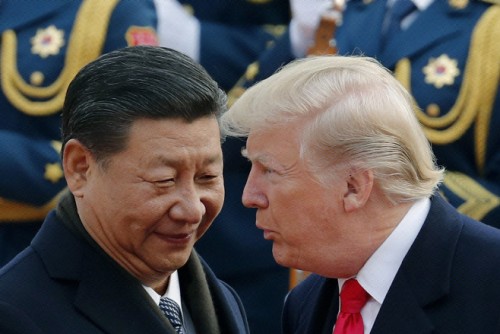 |
| U.S. President Donald Trump and Chinese President Xi Jinping speak during a welcome ceremony at the Great Hall of the People in Beijing on November 9, 2017. / Source: AP-Yonhap News |
Chinese President Xi Jinping is pushing to leverage trade negotiations with U.S. President Donald Trump to force a shift in Washington’s Taiwan policy, the Wall Street Journal reported on September 27.
According to sources cited by the paper, Xi believes Trump’s eagerness for a trade deal gives Beijing an opportunity to press the U.S. into formally declaring that it opposes Taiwan’s independence—going beyond the long-standing U.S. position of simply “not supporting” it. Such a move, analysts say, would mark a historic break from U.S. strategic ambiguity and hand Xi a major political victory at home.
Evan Medeiros, a former senior Asia adviser at the Obama White House, told the Journal: “Driving a wedge between the U.S. and Taiwan is the holy grail for China’s leadership. Xi may see his interactions with Trump as the best chance to achieve this.”
Xi is expected to meet Trump during the APEC summit in Gyeongju, South Korea, on October 31–November 1. Since taking power in 2012, Xi has framed Taiwan’s unification with the mainland as a core part of his “Chinese Dream” and has repeatedly warned that foreign intervention will not block reunification.
The U.S. has maintained a “One China” policy since 1979, recognizing Beijing as the sole legal government of China while maintaining unofficial ties with Taipei. Successive administrations have avoided explicitly opposing Taiwan independence, instead calling for peaceful resolution of cross-strait issues.
If Trump were to endorse “opposition” to independence, it would signal a shift toward aligning with Beijing’s stance and could bolster Xi’s authority domestically, the report noted.
Unlike former President Joe Biden, Trump has avoided saying whether the U.S. would defend Taiwan in the event of a Chinese attack, citing the need to preserve leverage in negotiations. His administration has also recently delayed arms sales to Taiwan and blocked President Lai Ching-te’s transit stop in the U.S., fueling speculation that trade talks are taking precedence over Taiwan support.
Still, Trump officials stress that the U.S. continues to deter Chinese coercion while helping Taiwan strengthen its defenses with drones and munitions. “The One China policy remains the same as in Trump’s first term,” a senior administration official said, pointing to continued arms sales and defense cooperation.
Secretary of State Marco Rubio privately reaffirmed to Chinese Foreign Minister Wang Yi earlier this year that Washington “does not support Taiwan independence.” However, U.S. officials noted that his remarks focused on opposing China’s coercive behavior. The State Department’s Taiwan fact sheet was also updated in February, notably removing the phrase from the Biden era that explicitly said the U.S. “does not support Taiwan independence,” according to the Journal.
Most Read
-
1
-
2
-
3
-
4
-
5
-
6
-
7





















